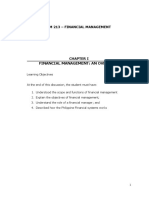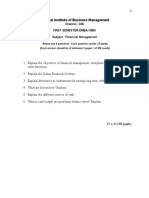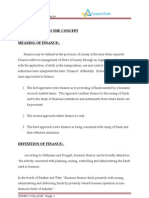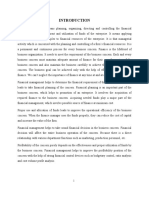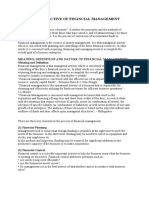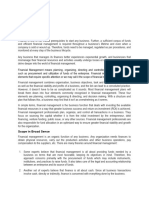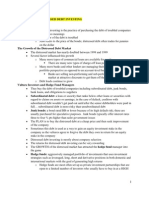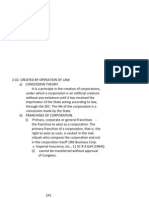International Journal of Business and Management Invention (IJBMI)
International Journal of Business and Management Invention (IJBMI)
Uploaded by
inventionjournalsCopyright:
Available Formats
International Journal of Business and Management Invention (IJBMI)
International Journal of Business and Management Invention (IJBMI)
Uploaded by
inventionjournalsCopyright
Available Formats
Share this document
Did you find this document useful?
Is this content inappropriate?
Copyright:
Available Formats
International Journal of Business and Management Invention (IJBMI)
International Journal of Business and Management Invention (IJBMI)
Uploaded by
inventionjournalsCopyright:
Available Formats
International Journal of Business and Management Invention ISSN (Online): 2319 8028, ISSN (Print): 2319 801X www.ijbmi.
i.org Volume 2 Issue 11 November. 2013 PP.42-46
Analysis of Effective Utilization of Funds
1
1 2
Shilpa R, 2Rakesh H M
Lecturer, Dept of MBA VTU PG Center, Mysore Assistant Professor Dept of MBA, VVCE, Mysore
ABSTRACT: This paper investigates the necessity of effective utilization of funds. Financial Management
involves critical management of funds. This simply implies optimizing monetary resources to meet with unavoidable risk cover and expenses. The management of finance is crucial to personal and business welfare! Financial Management means putting together the economic resources at hand to make efficient use of them and taking decisions that can successfully culminate in acquiring more assets for the family or business. With effective management of funds, you can even attract finance to meet the short term and long term requirement of the family or firm. The whole process is intense and deals with the selection of specific or a combination of assets to deal with a financial issue, if any.
KEYWORDS: Financial Management, Effective utilization, Effective management I. INTRODUCTION
Finance is indispensable to every kind of business and hence it is rightly said to be the life blood of a business. Business finance is the activity concerned with the estimation, raising and administrating the funds to be used in business enterprises. Financial Management is concerned with the acquisition, financing and management of assets with some overall goal in mind. It is the process of planning decisions in order to maximize the owner's wealth. Therefore Financial management is the management and control of money and money related operations within a business. In recent years, the changing regulatory and economic environment coupled with the globalization of business activities have increased the complexity as well as the importance of the financial activity. As a result, the financial management function has become more demanding and complex. Therefore Financial Management is the planning, organizing, directing and controlling the financial activities such as procurement and utilization of funds of the enterprise. It means applying general management principles to financial resources of the enterprise. There are two basic function of financial management is acquisition of external funds as well as the efficient and wise allocation of funds to various uses.
II. EFFECTIVE UTILIZATION OF FUNDS
With the growth of business boundaries to global area. The role of finance manager is becoming more complex, technical and more important in steering the organization wheels in proper direction. One of the role of financial manager includes effective utilization of funds. He has to select an investment pattern is related to the use of funds. The funds should be spent on fixed assets and then an appropriate portion will be retained for working capital. While investing the amount on fixed assets, decision making techniques like capital budgeting, opportunity cost analysis etc may be applied and principles of safety, liquidity, profitability etc should be considered.
1)
Fund will be invested on Fixed Asset : The funds are to be investing in fixed assets is usually an investment in the future and the value of the investment will depreciate over time (this is a good thing). As investments depreciate, the return on the investment increases. And also the company can produce optimum level. Fund will be invested on Current Asset : It is concerned with allocation of funds among various short term assets. For this we can use working capital management. The firm must keep in view the need for adequate working capital, and they do not keep too much funds blocked in inventories, book debts, cash etc.
2)
www.ijbmi.org
42 | Page
Analysis of Effective Utilization of Funds III. FINANCIAL PLANNING
The Finance Manager has to estimate the financial requirements of the company. The manager should determine the sources from which capital can be raised and determine how effectively and judiciously these funds are put into use so that repayments can be done in time. Financial planning is deciding in advance the course of action for future. Financial planning includes: 1) 2) 3) 4) Requirement of assets (fixed). Investment in intangible assets like patents, copyrights, etc. Amount required for current assets like stocks, cash, bank balances, etc. Cost of set-up and likely expenses to be incurred on the new issue of shares and debentures.
The financial planning process involves the following steps: 1. Projection of financial statements Financial statements are the company's profit and loss account and the balance sheet. The statements can be prepared for a certain period of future time and they help the manager to determine the amount of fund requirements. 2. Determination of funds needed: The estimations are drawn in terms of sales of product, the cost of production, marketing activities, etc., Finance Manager can draw up a plan as to the fund requirement based on the time factor. He can know whether the funds are to be procured on a short term basis or on a long term basis. 3. Forecast the availability of funds A company will have a steady flow of funds. If the manager is able to forecast these amounts properly, then the moneys to be borrowed can be reduced, thus saving on the interest payments. 4. Establish and maintain control system: Control system is ineffective without adequate planning and the adequacy of planning can be gauged only through proper control measures. Both these activities are essential for effective utilization of funds. 5. Develop procedures: There should be a procedure for basic plans to achieve. Financial Management involves critical management of funds and implies optimizing monetary resources to meet with unavoidable risk cover and expenses. Financial Management puts together the economic resources at hand to make efficient use of them and taking decisions that can successfully culminate in acquiring more assets for the family or business. With effective management of funds, it is possible to attract finance to meet the short term and long term requirement of firm.
IV.
FINANCIAL MANAGEMENT ANALYSIS
The analysis deals with the calculated and predicted cash inflow and outgoings. The analysis is directed towards the study of the effect of existent funds on managerial objectives. Financial management handles everything from procuring the funds to effective utilization of the same. Dedicated analysis handles procurement of funds from multiple sources and since the funds are from different sources, they naturally need to be addressed considering the difference with regards to the potential risk and control. Management of business funds should ideally capitalize on equity capital, in spite of it being the most expensive source of funds. Effective management of finances involves calculation of risk, cost and control and maintaining the cost of funds at minimum. This is done with the intent of establishing a proper balance between the involved risk and optimized control. Utilization of Funds Financial management cannot be addressed without first designing a strategy to ensure the proper utilization of funds. This helps to evade situations in which the funds remain idle or lack of profitable utilization of funds in hand. When availing of funds for the business it is important to understand the involved cost and risk factors. Wastage of funds will only result in the business short and long-term objectives not being met and ultimately - loss! The funds existent within the business should be critically reviewed from time to time and employed properly and profitably.
www.ijbmi.org
43 | Page
Analysis of Effective Utilization of Funds V. SCOPE AND EXTENT
The imperatives sound financial management in all types of organizations, to guarantee efficient use of all resources. Research reveals that many firms liquidate because of mismanagement of funds and not, as it is commonly believed, because of obsolete technology or the lack of skilled labor. Financial management is designed and customized according to different client needs to optimize output from the assessed fund input. In a situation where resources seem scarce and the demand for funds is high, proper financial management is an absolute necessity. The objectives of efficient financial management include maximization of profit. However, profit maximization is a limited objective and if it becomes the sole focus, then the approach only leads to more problems! Profit maximization must take into consideration the relationship between risk and profit and work towards achieving a balance. The value of a business is analyzed on the evaluation of the stock market price. Financial management should take into account present and expected future income and the dividend policy of the firm to come up with a near perfect understanding of the company's progress potential. Cash Pooling Providing a business has excellent cash visibility, cash pooling can be an effective way to optimize the use of surplus funds. The practice of moving cash around accounts to benefit from the very best credit and debit positions possible can help corporations to increase their interest returns. Cash pooling will also help them to minimize their exposure to unnecessary borrowing and protect against negative bank balances, which can impact both their finances and their reputation. From an administrative point of view, cash pooling can benefit firms as they can concentrate all activity on a single account, where sufficient funds are always in place. This way they dont incur unne cessary bank fees and can generate income from interest paid on larger balances. These assets can then be used to help grow the company or provide a strong buffer in the event of further economic downturns. Intra-company Netting Similarly, intra-company netting offsetting cash flows between corporate bank accounts to minimize the overall number of transactions required also helps businesses to optimize the use of their surplus funds by reducing the cost of carrying out cross-border business. Global firms need to bear these costs in mind and those that practice netting reduce this financial burden by settling costs incurred when cash is moved between international business units belong to the same corporation. Minimizing foreign exchange exposures by offsetting accounts receivable and accounts payable within the same business can help enhance assets. Cash Visibility All this is only possible by gaining a high level of cash visibility, so that a treasury department has immediate insight into their international bank balances whenever they need it. Chief Financial Officers are increasingly being asked to achieve more with less and this is why optimal use of available funds is so essential in todays business world. Companies are expanding overseas an d are finding themselves with complex cash positions that need to be tracked and optimized at all times and this is a challenge too far for many. As a result, some resort to easy options, such as dividend payments, instead of maximizing returns from the surplus they are generating. By implementing a treasury management solution, businesses gain an enhanced level of cash visibility, which equips them with the insight they need to turn their surplus into some serious profit.
VI.
MEANING OF FINANCIAL MANAGEMENT
Finance is the lifeblood of every business; management of it requires special attention. Financial management is that activity of management which is concerned with the planning, procuring and controlling of the firm's financial resources. During 1930s and 1940s, there was a concern of raising adequate funds and maintaining liquidity for sound financial structure. This is also known as 'Traditional Approach' of procurement and utilization of funds required by a firm. Thus, it is regarded as an art and science of rising and spending of funds. In the words of Paisco, "In a modern money using economy, finance is defined as the provision of money at the time when it is
www.ijbmi.org
44 | Page
Analysis of Effective Utilization of Funds
needed." The traditional approach emphasized the acquisition of funds and ignored efficient allocation and constructive use of funds. It does not give sufficient attention to the management of working capital. During 1950s, the need for profitable allocation of scarce capital resources was recognized and in 1960s and 1970s many analytical tools and concepts like funds flow statement, ratio analysis, cost of capital, earning per share, optimum capital structure, portfolio theory etc. were emphasized. As a result, a broader concept of finance began to be used. Thus, the modern approach to finance emphasizes the proper allocation and utilization of funds in addition to their economical procurement. Thus, business finance, in the words of Authman and Dongall, may broadly be defined as "activity which is concerned with the planning, raising, controlling and administering of funds used in the business." Modern business finance includes the following 1) 2) 3) 4) Determining the capital requirements of the firm. Raisin of sufficient funds to make an ideal or optimum capital structure Allocation of funds among various types of assets Financial control so as to ensure efficient use of funds.
VII.
CORPORATION FINANCE
The important area of finance is the corporate finance as the big business firms require a huge capital which is procured from the market/public. An efficient use of funds is very essential. Huge business houses are employing expertise to raise and utilize finance from various sources. The corporate finance refers to the planning, raising, administrating and controlling. Thus, it refers to planning, raising, administrating and financing of expansion of business and the financial adjustments.
VIII. OBJECTIVES OF FINANCE FUNCTION
For optimum financial decisions, the objectives of financial management shall be clearly defined in to two types, namely; Profit Maximization and Wealth Maximization. It should be laid down that they contribute directly towards the achievement of overall business objectives. Objectives provide a normative framework within which a firm is to take decisions. The functional area of objective of the business and contribute directly towards it. The main objectives of a business are survival and growth. In order to survive ups and downs in the business, the business must earn sufficient profits and it should also maintain proper relations with shareholders, customers, suppliers and other social groups. The financial management of an organization must seek to achieve the following objectives: 1) 2) 3) 4) 5) 6) Ensuring adequate and regular supply of funds. To provide a fair rate of return to the shareholders. To ensure effective utilization of funds by maintaining proper balance between profitability, liquidity and safety. To generate and build up sufficient surplus for expansion and growth through ploughing back of profits. Minimizing cost of capital by developing a sound capital between various securities issued by the company. Coordinating the activities of the finance department with the activities of other departments in the organization.
IX. SCOPE OF FUNCTIONS OF FINANCIAL MANAGEMENT
The finance department of an enterprise performs several functions in order to achieve the above objectives. The scope of finance function is very wide. It consists of the following activities: 1. Estimating the Requirement of Funds The finance department will estimate the capital requirements of the firm accurately for long term and short term needs. In estimating the capital requirements of the business, finance department must take help of the budgets of various activities of the business prepared by the concerned departments. In the preliminary stage, estimation is done by promoters but in a growing concern it is done by the finance department. Unless the financial forecast is correct, business is likely to run into difficulties due to excess or shortage of funds. Correct estimates ensure the availability of funds as and when they are needed. In estimating the requirement of funds, nature and size of the business, modernization and expansion plan should be given due consideration.
www.ijbmi.org
45 | Page
Analysis of Effective Utilization of Funds
2. Determining the Capital Structure Capital structure means the kind and proportion of different securities for raising the required funds. After determining the total requirement of funds decision regarding the type of securities to be issued and the relative proportion between them is to be taken. The finance department shall determine proper mix of debt and equity. In determining ratios cost of raising finance from different sources, period for which funds are required and several other factors should be considered. A proper balance between risk and returns should be maintained. 3. Choice of Sources of Finance A company can raise funds from different sources e.g. shareholders, debenture holders, bank loans, financial institutions, public deposits etc. Before raising the funds, it has to decide the source from which the funds are to be raised. The choice of the source of finance should be very carefully made by taking a number of factors into account such as cost of raising funds, conditions attached, charge on assets, burden of fixed charges, dilution of ownership and control etc. 4. Investment of Funds The funds raised from different sources should be prudently invested in various assets -short term as well as long term to optimize the return on investment. For taking decisions for the investment of long term funds, a careful assessment of various alternatives should be made through capital budgeting, opportunity cost analysis and many other techniques used to evaluate the investment proposals. A part of the long term funds should be invested in working capital of the company. While taking decision for the investment of funds in long term assets, management should be guided by three basic principles, viz. safety, profitability and liquidity. 5. Management of Cash The responsibility of finance manager is to see that an adequate supply of cash is available at proper time for the smooth running of the business. Cash is needed to purchase raw materials, pay off creditors, to pay to workers and to meet the day to day expenses of the business. Availability of cash is necessary to maintain liquidity and credit- worthiness of the business. Excess cash must be avoided as it costs money. If there is any cash in excess, it should be invested in near cash assets such as investments etc. which may be converted into cash within no time. A cash flow statement should be prepared by the department to know the correct need of cash is essential to achieve the goal of profitability and liquidity. 6. Disposal of Surplus Another prime function of the finance department is to allocate the surplus. After paying all taxes, the available surplus of the business can be allocated for three purposes; a) For paying dividend to the shareholders as a return on their investment b) For distributing bonus to workmen and company's contribution to other profit sharing plans c) For ploughing back of profits for the expansion of business. 7. Financial Controls The financial manager will be under obligation to check the financial performance of the funds invested in the business. Number of techniques are there to evaluate the performance viz. Return on Investment (ROI), budgetary control, cost control, internal audit, ratio analysis and break-even point analysis. The financial manager must lay emphasis on financial planning as well.
X. CONCLUSION
The study reveals related information for efficient and effective utilization of funds and requirement for effective utilization of funds. The aim of financial management is to reduce the problem and ensure fiscal growth of the enterprise. We know that finance is the lifeblood of every business; and its management requires special attention. Financial management is the activity of management which is concerned with the planning, procuring and controlling of the firm's financial resources . Organizations future will depend upon the effective utilization of funds like growth, expanding the company, long run of the company. If funds are used effectively then the organization has healthy growth in all the ways.
REFERENCES
[1] [2] [3] [4] [5] Multinational financial management by Alan C. Shapiro. International Financial Management by Jeff Madura, Mc Graw Hill. Financial management , institute book of ICAI. International financial management by Cheol Eun, Mcgraw-Hill. Effective use of financial resources by ozgur pehlivan
www.ijbmi.org
46 | Page
You might also like
- Financial Management: Ariel Dizon Pineda, CPADocument88 pagesFinancial Management: Ariel Dizon Pineda, CPARenz Fernandez90% (10)
- Financial Management Class Notes Bba Iv Semester: Unit IDocument49 pagesFinancial Management Class Notes Bba Iv Semester: Unit IGauravs100% (1)
- Top Glove PDFDocument39 pagesTop Glove PDFWan Khaidir71% (7)
- Presentation On BCG Matrix On Coca-ColaDocument18 pagesPresentation On BCG Matrix On Coca-ColaHossain Mohammad Imran88% (8)
- 2019 Caf-7 Far-IiDocument137 pages2019 Caf-7 Far-IiMuhammad YahyaNo ratings yet
- Econ Question BankDocument55 pagesEcon Question BankWilliam MaNo ratings yet
- Internship ReportDocument33 pagesInternship Reportskbinty0% (1)
- Chapter 1 Overview of Financial ManagementDocument6 pagesChapter 1 Overview of Financial ManagementLouise John BacudNo ratings yet
- Unit 1Document9 pagesUnit 1E11Ayush MinjNo ratings yet
- FinanceDocument15 pagesFinanceGuptaji gamingNo ratings yet
- Essay Contents:: Essay # 1. Introduction To Financial ManagementDocument14 pagesEssay Contents:: Essay # 1. Introduction To Financial ManagementGilberto MuhiNo ratings yet
- WORK SHEET - Financial Management: Q1) Define Financial Management. Discuss Its Characteristics and ObjectivesDocument3 pagesWORK SHEET - Financial Management: Q1) Define Financial Management. Discuss Its Characteristics and ObjectivesMukesh Singh100% (1)
- Chapter I - Overview-of-Financial-ManagementDocument14 pagesChapter I - Overview-of-Financial-ManagementDenmark Simon- PascuaNo ratings yet
- Project ReportDocument13 pagesProject ReportgraciousNo ratings yet
- Exm 12970Document17 pagesExm 12970Pavan JpNo ratings yet
- Sandesh Sir: Anuj NairDocument55 pagesSandesh Sir: Anuj NairAnuj NairNo ratings yet
- Financial Management Lecture 101BDocument5 pagesFinancial Management Lecture 101BDenied Stell100% (1)
- A Project On Capital StructureDocument62 pagesA Project On Capital StructurejagadeeshNo ratings yet
- Abm 801 - L 1 1Document10 pagesAbm 801 - L 1 1gangadharparadkar841No ratings yet
- Introduction To Financial ManagementDocument34 pagesIntroduction To Financial ManagementKevin OnaroNo ratings yet
- Gikondo Rusizi - Ur - Cbe Managerial Finance Notes April 2023 April 2023Document324 pagesGikondo Rusizi - Ur - Cbe Managerial Finance Notes April 2023 April 2023Cyiza Ben RubenNo ratings yet
- FM Unit IDocument15 pagesFM Unit ILakshmi RajanNo ratings yet
- Financial Management Unit IDocument29 pagesFinancial Management Unit Igaurang rathoreNo ratings yet
- Meaning of Financial Management Financial ManagementDocument5 pagesMeaning of Financial Management Financial ManagementDiwakar VatsNo ratings yet
- Inventory Management SWATHIDocument96 pagesInventory Management SWATHISakhamuri Ram'sNo ratings yet
- Bsit - Lec 2Document7 pagesBsit - Lec 2Shanzay NoorNo ratings yet
- ECC3 L1Document17 pagesECC3 L1mieshafiedxNo ratings yet
- Unit 1 Financial ManagmentDocument20 pagesUnit 1 Financial ManagmentMubin Shaikh NooruNo ratings yet
- UNIT 1: Introduction of Financial Management: New Law College, BBA LLB 3 Yr Notes For Limited CirculationDocument15 pagesUNIT 1: Introduction of Financial Management: New Law College, BBA LLB 3 Yr Notes For Limited CirculationSneha SenNo ratings yet
- Business Finance AssingmentDocument29 pagesBusiness Finance AssingmentShivaniNo ratings yet
- BadhravathiDocument82 pagesBadhravathitvasanthoshNo ratings yet
- Financial ManagementDocument18 pagesFinancial ManagementJohnykutty JosephNo ratings yet
- UntitledDocument3 pagesUntitledZeyNo ratings yet
- Synthesis Fin ManDocument2 pagesSynthesis Fin ManRadhel Faith ToloNo ratings yet
- Introduction To Managerial Finance/Financial Management: The Resources or 8Ms of Management AreDocument3 pagesIntroduction To Managerial Finance/Financial Management: The Resources or 8Ms of Management AreBai Nilo100% (2)
- PROJECT Sharath K SDocument92 pagesPROJECT Sharath K SMadhan SNo ratings yet
- Special Topics in Financial ManagementDocument3 pagesSpecial Topics in Financial ManagementPaglinawan Al Kim100% (1)
- The Challenging Role of A Finance Manager in A Dynamic Business EnvironmentDocument6 pagesThe Challenging Role of A Finance Manager in A Dynamic Business EnvironmentMuhammad ArifNo ratings yet
- Financial Management - Meaning, Objectives and FunctionsDocument5 pagesFinancial Management - Meaning, Objectives and FunctionsRuchi ChhabraNo ratings yet
- Introduction To Financial ManagementDocument29 pagesIntroduction To Financial Managementraymundojr.junioNo ratings yet
- FM Chapter 1Document11 pagesFM Chapter 1evangelistaallyssamae31No ratings yet
- FM Unit 1Document41 pagesFM Unit 1KarishmaNo ratings yet
- A Study On The Financial Management Concepts For Organizational SuccessDocument4 pagesA Study On The Financial Management Concepts For Organizational SuccessHarsh KumarNo ratings yet
- Introduction To Financial ManagementDocument24 pagesIntroduction To Financial ManagementKabile MwitaNo ratings yet
- 15.Lec.No.15Document2 pages15.Lec.No.15SRIGNYAREDDYNo ratings yet
- 01 Financial ManagementDocument84 pages01 Financial ManagementNambi RajanNo ratings yet
- John Edward Pangilinan BS Accounting Information SystemDocument5 pagesJohn Edward Pangilinan BS Accounting Information SystemJohn Edward PangilinanNo ratings yet
- Financial ManagementDocument17 pagesFinancial ManagementPallavi SharmaNo ratings yet
- What Is Strategic Financial ManagementDocument10 pagesWhat Is Strategic Financial Managementpra leshNo ratings yet
- LOANSS AND ADVANCES - Complete-1Document93 pagesLOANSS AND ADVANCES - Complete-1Imam AnnigeriNo ratings yet
- Financial Management: Graduate School Master of Arts in Education Major: Educational Management Financial ManagementDocument3 pagesFinancial Management: Graduate School Master of Arts in Education Major: Educational Management Financial ManagementJoje Sadili CostañosNo ratings yet
- BbaDocument82 pagesBbaJoshna PNo ratings yet
- Financial Management AssignmentDocument5 pagesFinancial Management AssignmentZeeshan UmerNo ratings yet
- FM Notes Unit 1&2Document32 pagesFM Notes Unit 1&2prem nathNo ratings yet
- 1st Chapter Accounts NotesDocument4 pages1st Chapter Accounts Notessahil rajNo ratings yet
- Financial Management - Meaning, Objectives and Functions Meaning of Financial ManagementDocument9 pagesFinancial Management - Meaning, Objectives and Functions Meaning of Financial ManagementGely MhayNo ratings yet
- Financial ManagementDocument11 pagesFinancial ManagementWaseem KhanNo ratings yet
- St. Vincent College of CabuyaoDocument5 pagesSt. Vincent College of CabuyaoFlorenz AmbasNo ratings yet
- Inventory ManagementDocument109 pagesInventory ManagementsreevardhanNo ratings yet
- 2024 Chapter 1 Principles of Financial ManagementDocument8 pages2024 Chapter 1 Principles of Financial ManagementntsakovuqueiaNo ratings yet
- Lesson 1.pptx-1Document8 pagesLesson 1.pptx-1batanghamog828No ratings yet
- Chapter 1Document10 pagesChapter 1vanshikaladhani27No ratings yet
- Expert Financial Analysis: Strategies for Professional SuccessFrom EverandExpert Financial Analysis: Strategies for Professional SuccessNo ratings yet
- Student Engagement: A Comparative Analysis of Traditional and Nontradional Students Attending Historically Black Colleges and UniversitiesDocument12 pagesStudent Engagement: A Comparative Analysis of Traditional and Nontradional Students Attending Historically Black Colleges and Universitiesinventionjournals100% (1)
- Inter-Caste or Inter-Religious Marriages and Honour Related Violence in IndiaDocument5 pagesInter-Caste or Inter-Religious Marriages and Honour Related Violence in IndiainventionjournalsNo ratings yet
- The Usage and Understanding of Information and Communication Technology On Housewife in Family Welfare Empowerment Organization in Manado CityDocument10 pagesThe Usage and Understanding of Information and Communication Technology On Housewife in Family Welfare Empowerment Organization in Manado CityinventionjournalsNo ratings yet
- A Critical Survey of The MahabhartaDocument2 pagesA Critical Survey of The MahabhartainventionjournalsNo ratings yet
- Non-Linear Analysis of Steel Frames Subjected To Seismic ForceDocument12 pagesNon-Linear Analysis of Steel Frames Subjected To Seismic ForceinventionjournalsNo ratings yet
- Effect of P-Delta Due To Different Eccentricities in Tall StructuresDocument8 pagesEffect of P-Delta Due To Different Eccentricities in Tall StructuresinventionjournalsNo ratings yet
- Non-Linear Analysis of Steel Frames Subjected To Seismic ForceDocument12 pagesNon-Linear Analysis of Steel Frames Subjected To Seismic ForceinventionjournalsNo ratings yet
- Inter-Caste or Inter-Religious Marriages and Honour Related Violence in IndiaDocument5 pagesInter-Caste or Inter-Religious Marriages and Honour Related Violence in IndiainventionjournalsNo ratings yet
- Effect of P-Delta Due To Different Eccentricities in Tall StructuresDocument8 pagesEffect of P-Delta Due To Different Eccentricities in Tall StructuresinventionjournalsNo ratings yet
- Immobilization and Death of Bacteria by Flora Seal Microbial SealantDocument6 pagesImmobilization and Death of Bacteria by Flora Seal Microbial SealantinventionjournalsNo ratings yet
- A Novel Bayes Factor For Inverse Model Selection Problem Based On Inverse Reference DistributionDocument4 pagesA Novel Bayes Factor For Inverse Model Selection Problem Based On Inverse Reference DistributioninventionjournalsNo ratings yet
- Di OutlineDocument81 pagesDi OutlineRobert E. BrannNo ratings yet
- Selfish Investment StrategiesDocument2 pagesSelfish Investment StrategiesAshutosh VijayNo ratings yet
- New Premium Chart 18%-1-2Document10 pagesNew Premium Chart 18%-1-2Rajat GuptaNo ratings yet
- FIN. 4828 CH. 18: CreateDocument22 pagesFIN. 4828 CH. 18: CreateSwati VermaNo ratings yet
- Private CorpDocument20 pagesPrivate CorpMaricris Buot IndanaoNo ratings yet
- Ugc Net Management Solved Paper II j1711Document8 pagesUgc Net Management Solved Paper II j1711Raajkuumar Khatri100% (3)
- Chapter 2 Financial Institutions, Financial Intermediaries, and Asset Management FirmsDocument19 pagesChapter 2 Financial Institutions, Financial Intermediaries, and Asset Management FirmsDavid GreyNo ratings yet
- Project Report ON "To Study of Npa Management": Rode Santosh FakiraDocument67 pagesProject Report ON "To Study of Npa Management": Rode Santosh FakiraTejashree GadhaveNo ratings yet
- Gibson 11e Ch08Document24 pagesGibson 11e Ch08Keval KamaniNo ratings yet
- Revised Corporation CodeDocument3 pagesRevised Corporation CodeEM DOMINGONo ratings yet
- Internship Project ON Fundamental and Technical Analysis On Equity DerivativesDocument85 pagesInternship Project ON Fundamental and Technical Analysis On Equity Derivativestarun nemalipuriNo ratings yet
- Tirana-Times-February-1-2013 LPA Law Firm Albania Company FormationDocument24 pagesTirana-Times-February-1-2013 LPA Law Firm Albania Company FormationohoxholliNo ratings yet
- 1 An Investment Perspective of Human Resource ManagementDocument18 pages1 An Investment Perspective of Human Resource ManagementHiro Hirose0% (1)
- P2 AnswerKey PDFDocument9 pagesP2 AnswerKey PDFJay Mark DimaanoNo ratings yet
- GAO Mortgage Foreclosure ReportDocument77 pagesGAO Mortgage Foreclosure ReportBeverly Tran100% (1)
- Finance Report MbaDocument35 pagesFinance Report MbaManoj BeheraNo ratings yet
- Bus - Valuation - StudentDocument5 pagesBus - Valuation - StudentMilan TilvaNo ratings yet
- Employee Benefits Director Manager in New York City Resume Michael HarrisDocument2 pagesEmployee Benefits Director Manager in New York City Resume Michael HarrisMichael HarrisNo ratings yet
- CFA Level 2 - LOS Changes 2012 - 2013Document51 pagesCFA Level 2 - LOS Changes 2012 - 2013Prasanth RajuNo ratings yet
- Interview With J Welles WilderDocument7 pagesInterview With J Welles WilderScribd-downloadNo ratings yet
- 01-Opp ItoDocument64 pages01-Opp Itoishmael daroNo ratings yet
- MFS Module 1Document89 pagesMFS Module 1Navleen KaurNo ratings yet
- BDODocument6 pagesBDOGia Joyce AnchetaNo ratings yet
- Journal of Economic Behavior & Organization: Sergey Stepanov, Anton SuvorovDocument21 pagesJournal of Economic Behavior & Organization: Sergey Stepanov, Anton SuvorovRoza AsmildaNo ratings yet
- ChapterizationDocument134 pagesChapterizationAnurag Sawal50% (2)












